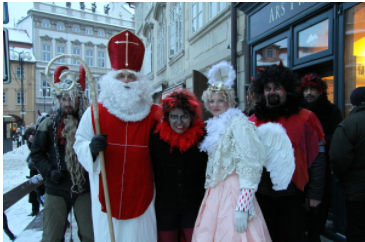Koleda, or Koliada, is an ancient pre-Christian Slavic festival, marking the winter solstice. Ancient Slavs believed that during the dark and cold winter, the border between the spiritual and the mortal worlds is the thinnest. The purpose of Koleda was to bring new light to this dark period and prepare for the next year by blessing local households and keeping malevolent spirits away. For this reason, candles and bonfires were lit in preparation for Koleda to help the winter turn to spring and symbolize the return of the Sun. This gave the ancient Slavs hope and lifted their spirits during the depressing winter.
New Years in The Czech Republic
The holidays are upon us and I thought we might look into Czech traditions for celebrating the New Year. In the Czech Republic, New Year’s Eve is called Silvestr, for the anniversary of the consecration of Pope Sylvester I, a saint who served as Pope of the Western Church from 314 to 335. Since the adoption of the Gregorian calendar in 1582, the December 31st feast date has coincided with New Year’s Eve
The Mystery of the Voynich Manuscript
In 1912, a strange manuscript surfaced in the collection of an antique-bookseller. It is written in a language that is not found anywhere else, contains pictures of plants that can not be identified, and astrological charts that don't match any records. The text today is known as the Voynich Manuscript, and it has been called one of the most mysterious books in the world.
Interested in Paying Less Taxes?
Dissolution of the Austro-Hungarian Empire
It's quite a difficult thing to pin down an exact historical reason for any significant event. We can, however, follow the lives of a specific royal family and the events that surrounded their tragic lives. Over the course of a seventy-two year span, we will look at the events that led to the creation and dissolution of the Austro-Hungarian Empire.
Covid-19 in the Czech Republic
There is no denying that 2020 has been an exhausting year. Towards the end of 2019, the Coronavirus reared its ugly head, and the world has been different ever since. Questions arose in all of our minds as to whether or not things will go back to normal. 2020 has seen its fair share of chaos, but the one thing that stands out during these trying times is the lack of social interaction.
The (puppet) Strings that Bind Nations
Puppet theatre is an integral part of Slovak and Czech local theatre and literary tradition. It also plays an important role in socialization, helping audiences young and old develop as creative thinkers and learn about cooperation, communication, and strengthening their sense of identity in society.
Fishy Christmas Traditions
One can often perceive the richness of any culture merely by taking the time to sit and listen to the stories it tells. Czech traditions are no exception to this, and this time of year is saturated with history, customs, and celebration of the valuable inheritances we’ve received from those that came before us. Perhaps by peeking into the traditions still celebrated in the Czech Republic and abroad, one can learn something about the history carved into its roots.
Foundation of Czechoslovakia
Celebrating St. Nicholas Day
Czech and American Carols
Christmas - A Western Tradition?
Everyone is familiar with the traditional European Christmas, and of course a jolly St. Nicholas. However, many are unaware of its Eastern origins. Saint Nicholas, a bishop known for his fabled practice of giving gifts in secret, was actually born in modern-day Turkey. In fact, only about a day’s journey away, this primarily Western tradition is being slowly adopted in Turkey, the so-called bridge between Europe and Asia.

























